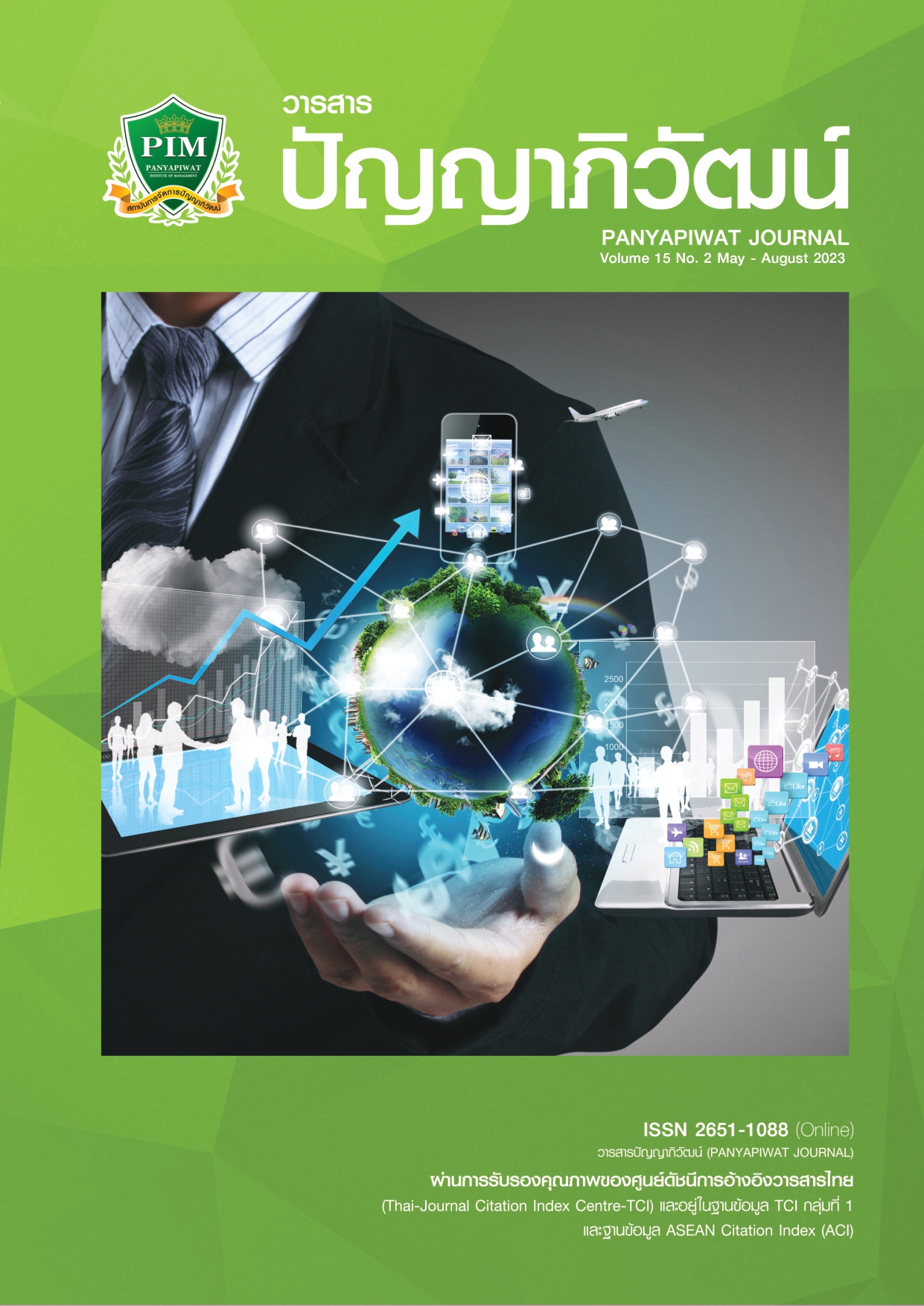ความคิดเห็นของนักศึกษาจีนต่อการจัดการความปลอดภัยของมหาวิทยาลัยไทยในภาวะวิกฤต COVID-19
Main Article Content
บทคัดย่อ
การวิจัยครั้งนี้มีวัตถุประสงค์เพื่อศึกษาความคิดเห็นของนักศึกษาจีนต่อการจัดการความปลอดภัยของมหาวิทยาลัยไทยในภาวะวิกฤต COVID-19 และเสนอแนวทางในการจัดการความปลอดภัยของมหาวิทยาลัยไทยในภาวะวิกฤต COVID-19 โดยใช้การวิจัยแบบผสมผสาน เก็บรวบรวมข้อมูลจากนักศึกษาจีนที่ศึกษาในมหาวิทยาลัยไทย ด้วยแบบสอบถาม จำนวน 500 คน และสนทนากลุ่ม จำนวน 3 กลุ่ม ผลการวิจัยพบว่า นักศึกษาจีนให้ความสำคัญต่อการจัดการความปลอดภัยในภาวะวิกฤต COVID-19 อยู่ในระดับมากนักศึกษาจีนที่มีเพศ ระดับการศึกษา และโปรแกรมการศึกษาแตกต่างกัน มีความคิดเห็นไม่แตกต่างกัน ในขณะที่นักศึกษาจีนที่ศึกษาในมหาวิทยาลัยที่ต่างประเภทกัน มีความคิดเห็นแตกต่างกัน
การวิจัยครั้งนี้เสนอว่า มหาวิทยาลัยควรจัดตั้งศูนย์เฉพาะกิจเพื่อจัดการภาวะวิกฤต ทำหน้าที่ประสานงานและให้บริการแก่นักศึกษา และจัดทำมาตรการความปลอดภัยในรูปแบบของการจัดการความต่อเนื่องทางธุรกิจครอบคลุม 1) การจัดการสุขภาพกายและจิตของนักศึกษา 2) การส่งเสริมให้มีการเรียนการสอนอย่างต่อเนื่องในภาวะวิกฤต คำนึงถึงความพร้อมของหลักสูตร ความสามารถและทักษะการสอนของอาจารย์ การมีส่วนร่วมของนักศึกษาในการเรียน ความเหมาะสมของอุปกรณ์การเรียนรู้ การเข้าถึงทรัพยากรแหล่งเรียนรู้ และปฏิสัมพันธ์ทางบวกระหว่างนักศึกษา และอาจารย์ และ 3) การส่งเสริมโอกาสในการได้งานของนักศึกษาช่วงสถานการณ์ COVID-19
Article Details

อนุญาตภายใต้เงื่อนไข Creative Commons Attribution-NonCommercial-NoDerivatives 4.0 International License.
“ข้าพเจ้าและผู้เขียนร่วม (ถ้ามี) ขอรับรองว่า บทความที่เสนอมานี้ยังไม่เคยได้รับการตีพิมพ์และไม่ได้อยู่ระหว่างกระบวนการพิจารณาลงตีพิมพ์ในวารสารหรือแหล่งเผยแพร่อื่นใด ข้าพเจ้าและผู้เขียนร่วมยอมรับหลักเกณฑ์การพิจารณาต้นฉบับ ทั้งยินยอมให้กองบรรณาธิการมีสิทธิ์พิจารณาและตรวจแก้ต้นฉบับได้ตามที่เห็นสมควร พร้อมนี้ขอมอบลิขสิทธิ์บทความที่ได้รับการตีพิมพ์ให้แก่สถาบันการจัดการปัญญาภิวัฒน์หากมีการฟ้องร้องเรื่องการละเมิดลิขสิทธิ์เกี่ยวกับภาพ กราฟ ข้อความส่วนใดส่วนหนึ่งและ/หรือข้อคิดเห็นที่ปรากฏในบทความข้าพเจ้าและผู้เขียนร่วมยินยอมรับผิดชอบแต่เพียงฝ่ายเดียว”
เอกสารอ้างอิง
Aristovnik, A., Keržič, D., Ravšelj, D., Tomaževič, N., & Umek, L. (2020) Impacts of the COVID-19 pandemic on life of higher education students: A global perspective. Sustainability, 12, 8438. https://doi.org/10.3390/su12208438
Cardona, B., Jain, S., & Canfeld-Davis, K. (2012). Home-school relationships: A qualitative study with diverse families. The Qualitative Report, 17(70), 1-20. https://doi.org/10.46743/2160-3715/2012.1738
Cochran, W. G. (1977). Sampling techniques (3rd ed). John Wiley & Sons.
Ding, J. L., & Sunalai, S. (2021). Perception of Chinese students towards safety management during COVID-19 situation and service marketing mix in selecting study at Thai universities. APHEIT Journal, 27(1), 1-12. [in Thai]
Diteeyont, W., & Yoosamran, L. (2021). Roles of educational technology for learning in new normal situations. Panyapiwat Journal, 13(2), 331-339. [in Thai]
Guba, E. G., & Lincoln, Y. S. (1981). Effective evaluation: Improving the usefulness of evaluation results through responsive and naturalistic approaches. Jossey Bass.
Guest, G., Namey, E., & McKenna, K. (2017). How many focus groups are enough? Building an evidence base for nonprobability sample sizes. Field Methods, 29(1), 3-22. https://doi.org/10.1177/1525822X16639015
Hatthasak, M., & Diloksamphan, P. (2021). A study of problem and satisfaction in online learning during the coronavirus disease 2019 (COVID-19) epidemic of the students of Kasetsart University, Bangkhen Campus. Journal of Education Research, Faculty of Education, Srinakharinwirot University, 16(1), 202-213. [in Thai]
Hsu, Y. L., Li, W. C., & Chen, K. W. (2010). Structuring critical success factors of airline safety management system using a hybrid model. Transportation Research Part E: Logistics and Transportation Review, 46(2), 222-235. https://doi.org/10.1016/j.tre.2009.08.005
Mok, K. H., Xiong, W., Ke, G., & Cheung, J. O. W. (2021). Impact of COVID-19 pandemic on inter national higher education and student mobility: Student perspectives from Mainland China and Hong Kong. International Journal of Educational Research, 105, 101718. https://doi.org/10.1016/j.ijer.2020.101718
Office of National Higher Education Science Research and Innovation Policy Council. (2020). Procedures in higher education, science, research and innovation to support
rehabilitation and restructuring of economy and society. https://www.nxpo.or.th/th/covid-19/ [in Thai]
Office of Permanent Secretary, Ministry of Higher Education, Science, Research, and Innovation. (2021). Number of new international students. https://data.go.th/dataset/univ_std_11_06 [in Thai]
Paichayontvijit, T., & Kwanyou, A. (2021). The economic impact of the COVID-19 situation to international programs in higher education in Thailand. Thammasat Journal, 40(3), 114-139. [in Thai]
Phoodee, W., & Pianpailoon, C. (2021). The scenario of teachers after the COVID-19 crisis. Panyapiwat Journal, 13(2), 321-330. [in Thai]
Phosai, E. (2021). The learning curriculum management in a crisis situation of school administrators under Nakhon Pathom Secondary Educational Service Office 9: A case study of the COVID-19 situation. Journal of Graduate School Sakon Nakhon Rajabhat University, 18(82), 22-31. [in Thai]
United Nations Children’s Fund (UNICEF) Thailand. (2020) Preliminary report: Exploring the impacts and needs of children and youths during the COVID-19 crisis. https://www.unicef.org/thailand/th/media/4031/fle [in Thai]
United Nations Educational, Scientific and Cultural Organization (UNESCO). (2020, February 17). Education: From disruption to recovery. https://en.unesco.org/covid19/educationresponse
Wang, C., Cheng, Z., Yue, X. G., & McAleer, M. (2020). Risk management of COVID-19 by universities in China. Journal of Risk and Financial Management, 13(2), 1-6. https://doi.org/10.3390/jrfm13020036
Waring, A. (1995). Safety management systems. Cengage Learning Emea. Zhai, Y., & Du, X. (2020). Mental health care for international Chinese students affected by the COVID-19 outbreak. The Lancet Psychiatry, 7(4), e22. https://doi.org/10.1016/S2215-0366(20)30089-4


